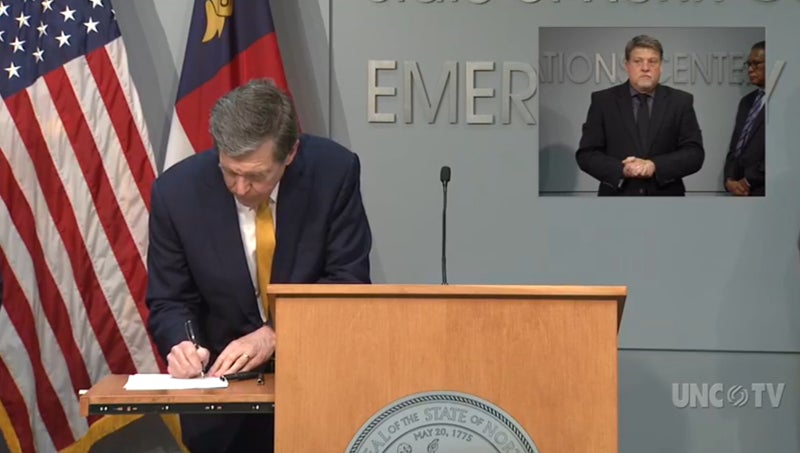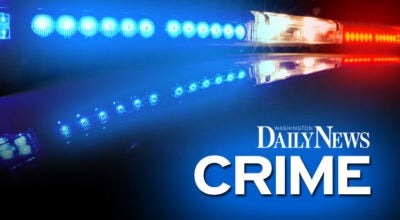COVID-19 laws provide financial, regulatory relief
Published 6:20 pm Monday, May 4, 2020

- BIPARTISAN EFFORT: North Carolina Gov. Roy Cooper signs a pair of bills passed by the N.C. General Assembly over the weekend. The two bills, passed unanimously by both the House and Senate, lay out plans for spending federal COVID-19 relief dollars and provide flexibility on a number of legal regulations tied to response. (UNCTV)
|
Getting your Trinity Audio player ready...
|
Flanked by Republican and Democratic lawmakers, North Carolina Gov. Roy Cooper signed two important pieces of legislation into law Monday, setting spending priorities and policy changes to help the state address COVID-19 recovery.
While House Bill 1043 outlines a plan to spend approximately $1.6 billion on relief measures, Senate Bill 704 lays out a wide range of policy changes related to disaster response.
“I am signing into law two critical relief bills that will provide assistance to families, schools, hospitals and small businesses as our state battles COVID-19,” Cooper said Monday. “There is more work ahead of us, and I hope the spirit of consensus behind these bills will continue.”
Both bills garnered bipartisan support in the General Assembly and were passed unanimously over the weekend before being presented for Cooper’s signature. In a legislative body that can sometimes be fraught with partisanship, House and Senate minority and majority leaders alike praised the spirit of cooperation that moved the legislation quickly.
H.B. 1043 — 2020 COVID-19 Recovery Act
Establishing a spending plan for nearly $1.6 billion of the $3.5 billion in Federal CARES Act money allocated to the state, H.B. 1043 spreads that money out among local governments, healthcare providers, schools and state agencies that have been negatively impacted by COVID-19. Spending measures include the following:
- $300 million for NCDOT to make up a budgetary shortfall supposedly caused by falling gas tax revenues, if allowed by federal guidelines;
- $150 million for counties ineligible to receive funding through the CARES act for COVID-19 response;
- $125 million in small business loans administered through the Golden LEAF Foundation; business owners can apply for these loans at www.goldenleaf.org/covid-19-nc-rapid-recovery-loan-program;
- $95 million to support North Carolina hospitals;
- $85 million for vaccine development, antibody testing, community testing and other COVID-19-related research at Duke University, University of North Carolina-Chapel Hill, East Carolina University, Campbell University and Wake Forest University;
- $75 million for school nutrition programs;
- $70 million for summer learning programs;
- $70 million for state government expenditures from March 1 to Dec. 30 related to COVID-19 response;
- $50 million to provide personal protective equipment and sanitation supplies;
- $50 million in health support for underserved communities including rural areas and minority communities;
- $44.4 million to the UNC System for increased cost of online course work and other expenses;
- $30 million for local schools to purchase computers and other devices for students;
- $25 million to support enhanced COVID-19 testing and tracing;
- $25 million to community colleges for enhanced online learning and other expenses;
- $20 million to support local health departments and the State Health Lab;
- $9 million for rural broadband;
- $6 million for food banks.
A full list of allocations is available via a summary of the bill here.
S.B. 704 — COVID-19 Recovery Act
While the House Bill focused on spending, the Senate package addressed a number of policy changes, ranging from tax relief to unemployment law changes.
On unemployment insurance, the law provides greater flexibility on determination of unemployment, elimination of a waiting period and work search requirements. It also allows employers who pay into claims to receive a tax credit for doing so.
In the realm of healthcare, the law directs the North Carolina Area Health Education Center to study the state’s ability to respond to a pandemic, as well as the impact COVID-19 has had on the healthcare system.
Further, the law provides immunity from civil or criminal liability for health care workers responding to COVID-19 and for providers’ decisions in response to the epidemic. Exceptions apply for willful misconduct, gross negligence and intentional infliction of harm.
The law also directs the North Carolina Department of Health and Human Services, in tandem with the North Carolina Department of Public Safety, to develop a plan for building up the state’s stockpile of personal protective equipment.
Other the key provisions in S.B. 704 include:
- An extension of driver’s license and registration expiration deadlines;
- Waived interest on tax payments normally due in April;
- Modified end-of-grade testing requirements for public schools;
- An adjusted 2020-21 public school calendar;
- Provisions allowing pharmacists to administer a COVID-19 vaccine once it is developed.
A full list of allocations is available via a summary of the bill here.
Cooper’s statewide stay-at-home order is scheduled to expire Friday, as the state enters Phase One of a gradual reopening process. Cooper said the public can expect more details on that plan Wednesday.





